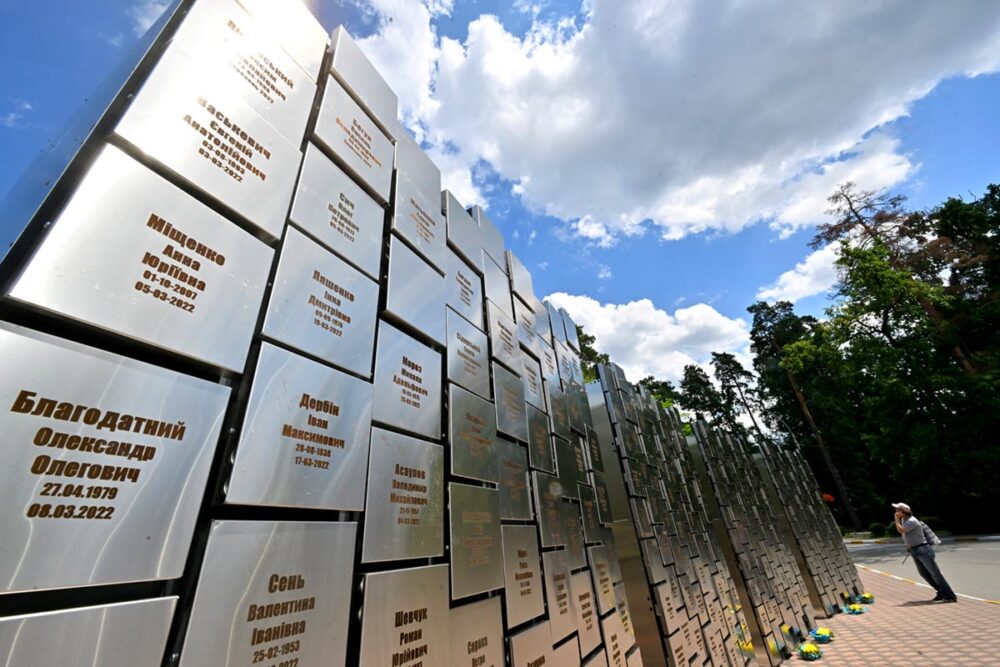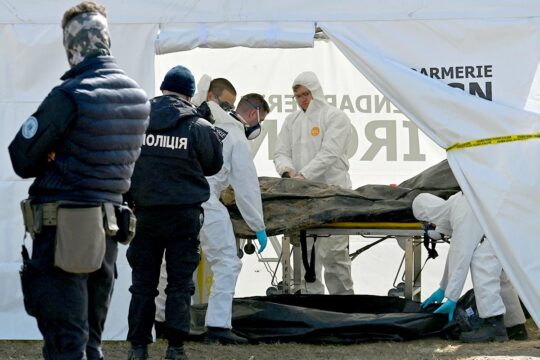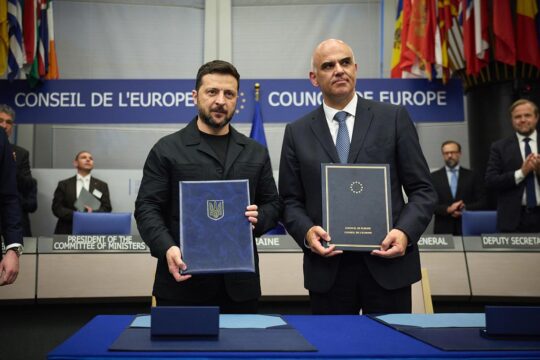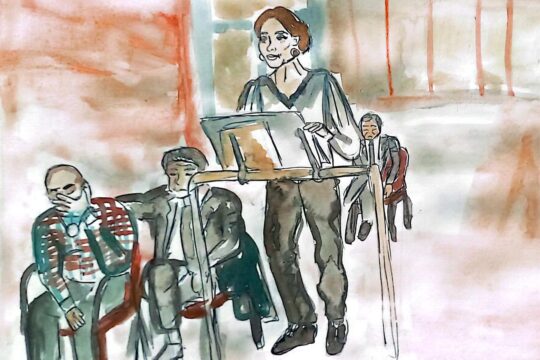Nine Russian Federation soldiers who committed violence against a civilian resident of Bucha (northeast of the Ukrainian capital Kyiv), held him captive, tied his hands, blindfolded him with duct tape and beat him, were judged in absentia and sentenced in an open session in late August, near the city of Irpin.
As a result of two months of investigation and pre-trial proceedings, it was established that the Russian military servicemen – Vasily Knyazev, Mikhail Kashin, Vyacheslav Lavrentiev, Semyon Maltsev, Grigory Naryshkin, Sergey Peskarev, Albert Radnayev, Dmitry Sergienko and Andrey Bizyaev –, who crossed the border of Ukraine after February 24, 2022, repeatedly detained and interrogated a civilian resident of Bucha working as an electronic equipment repairman to extract information about locations of the Ukrainian military.
“Russian servicemen several times picked up the victim (…) and held him against his will in one of the apartments of the Parkova Oselya residential complex in Lisova Bucha, starved him, and beat him,” says Serhiy Shubchyk, from the Irpin Prosecutor's Office. “Later he was released, but then taken for interrogation twice more, each time by different Russian soldiers. According to the victim, they suspected that, being an electrician, he was helping the Ukrainian armed forces.”
According to the prosecutor, the victim [whose identity has been protected] recognized the Russian servicemen who tortured him from a photo. Their contacts, phone numbers, names and surnames, places of service and social media pages were found, he explained. The suspects were notified of the court hearing through the Official Journal of Ukraine and by the Office of the Prosecutor General - but none of them appeared in court. Appointed lawyers represented them for free during the trial. According to the suspects' lawyer Yuriy Myshko, they were unable to contact the Russian servicemen and their relatives to properly present their defence.
“After attempts to contact the defendants via social media, their accounts would disappear, not only theirs but also those of their relatives,” says Yuriy Myshko, one of the defendants' lawyers. “The defence did everything possible to properly represent the accused. During the hearing, I appealed to the court's discretion, as I did not know the position of my clients.”
According to the public register of court decisions, the court found the nine Russian Federation soldiers guilty of committing a criminal offence under Article 438 (violation of the laws and customs of war). It sentenced to 12 years in prison the commander of the Russian military, Andrey Bizyaev, who gave criminal orders against the victim, to 11 years and six months of imprisonment Dmitry Sergienko, Semyon Maltsev, Mikhail Kashin and Vasily Knyazev, and the others to 11 years of imprisonment.
Since the only direct source of evidence in the case was the victim's testimony, it was thoroughly examined in the trial and recognized by the court as consistent and logical, and no significant differences between his testimony and the prosecution's case were found during the hearing, concluded the court after a trial which was carried out over a six-month period.
How to prosecute and carry out a court sentence?
The convicts will have to serve their sentences from the day they are arrested. But while the convicts are in Russia, there are mechanisms to bring criminals to justice, the prosecutor says: “First of all, it is necessary to properly disclose the verdict and, with the help of international cooperation, if they leave their country, it will be possible to detain and transfer them to the country where they were convicted. This is the most effective and efficient way, but it only works if they cross the border," says Serhiy Shubchyk.
As a result of the injuries inflicted by the Russian military servicemen, the victim partially lost his eyesight and suffered from an injury to his leg. The prosecutor's office advised him to file a civil lawsuit and claim compensation for moral and material damage, based on the court verdict.
MEN IN BLACK KILLED IN BUCHA: A RUSSIAN SUSPECT TALKS
The Security Service of Ukraine suspects Russian servicemen of the 76th Air Assault Division of war crimes, aggravated by premeditated murder, in the city of Bucha (north east of Kyiv, the capital city of Ukraine). The first main suspects were artillery gun commander Dmytro Antonnikov, born in 1996, senior intelligence specialist Ruslan Gorshkov, born in 2003, deputy platoon commander Denis Monakhov, born in 1997, and Artem Derkach, born in 2003, a native of Donetsk region, who serves as a senior artillery gunner. From February 27 to March 30, 2022, according to the investigation, they were present in Bucha, Kyiv region.
On February 27, soldiers on a 2S9 Nona-S self-propelled artillery gun were heading down Vokzalna Street towards the intersection with Nove Shosse Street. According to the prosecutor’s case, while the convoy was on the road, the battery's senior officer Vadim Tsvetkov ordered his subordinates to consider all civilians dressed in black as enemies.
A few minutes later, near a Novus convenience store, the Russians spotted an unarmed civilian who worked as a security guard and was wearing a black uniform. They opened fire on him. The man received a perforating gunshot wound to the chest causing damage to the right lung, which led to significant blood loss. The soldiers continued to drive in the convoy, and the victim died in the basement of the store two hours later.
In January of this year, Russian media reported that Tsvetkov, an officer from the Tver region, "died in the area of the special operation in Ukraine". But in February, another participant in the shooting of the security guard, Nikolai Kartashov, was captured by the Ukrainian Armed Forces in the Kharkiv region. And in August, the Ministry of Internal Affairs notified Kartashov of suspicion. The press report says that the prisoner has been testifying about war crimes committed by soldiers from his unit.
According to the Russian press, Kartashov received a probationary sentence for desertion in Russia last December. After that, he was sent back to fight in Ukraine and was captured. For the war crime, Kartashov faces up to 15 years in prison or a life sentence.
This report is part of our coverage of war crimes justice produced in partnership with Ukrainian journalists. A first version of this article was published on the "Sudovyi Reporter" and "Kotsyubynske" websites.







